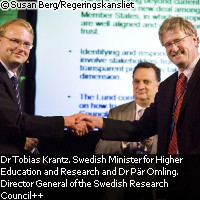Swedish Presidency: research must focus on grand challenges
At a conference on research and innovation held in Lund, Sweden, hosted by the Swedish Presidency of the Council of the European Union, approximately 350 researchers, policy makers and representatives from industry and research funding institutions agreed on a declaration stating that European research policy should focus on global 'grand challenges' such as climate change, water shortage and pandemics. The Lund Declaration, approved at the 'New world - New solutions' conference, was handed over on 9 July to Tobias Krantz, the Swedish Minister for Higher Education and Research. 'The global community is facing grand challenges,' the declaration states. 'The European Knowledge Society must tackle these through the best analysis, powerful actions and increased resources. Challenges must turn into sustainable solutions in areas such as global warming, tightening supplies of energy, water and food, ageing societies, public health, pandemics and security,' it adds. 'It must tackle the overarching challenge of turning Europe into an eco-efficient economy.' The declaration followed two days of discussions about the direction of research, during which Dr Krantz elaborated on the three main research priorities of the Swedish presidency. 'First, we must find ways to enhance the cooperation between research, education and innovation,' he said. 'Second, we want to develop a new governance structure for the European Research Area (ERA). [...] We must be able to argue that money invested in European research is money well spent. A more efficient system is a prerequisite for winning that fight.' Dr Krantz stressed that 'the Member States must engage themselves more in the development of the ERA, allowing better flow of knowledge and resources between Member States'. Political will and determination must go hand in hand with academic freedom, he highlighted. The third priority, said Dr Krantz, is to re-examine the structure of the EU's research framework programme (FP). 'Instead of being overly bureaucratic with a technical thematic structure, I believe it should be focused on achievements. We should use the European research programme to build knowledge to meet the grand challenges we face: climate change, water shortage, poverty, diseases. This will not only help improve Europe's competitive advantage; I believe it will also make the framework programme easier to understand and more accepted,' he explained. 'Basic research is vital to academic freedom,' the Swedish minister underlined. 'Researchers must have the guts and the resources to ask impolite and uncomfortable questions. Sometimes curiosity is a good enough reason to start a research project: [you] never know what it might lead to. That does not mean that private companies can't fund a research project - they certainly can. It just means that they will have to be prepared to get an answer they may not like.' The Lund Declaration echoes this sentiment, and promotes strengthening frontier research initiated by the research community itself. 'It is fundamentally important to create knowledge diversity, endowing the European Union with expertise, especially when confronted with unforeseen grand challenges and 'shocks',' it reads. 'Competition among researchers will ensure that research carried out in Europe is of international excellence.' The declaration also calls for support of both business development and public policy goals. 'Measures are needed to maximise the economic and societal impact of new knowledge in areas such as industrial, environmental and social policies, agriculture and regional development,' it reads. 'Links between these policy areas and research policies must be strongly improved.' The document stresses the importance of 'well-networked knowledge institutions', calling for the modernisation of universities and cooperation between universities and research institutions. This is a key element for enhancing the competitiveness of European research, it says, also urging 'the creation and maintenance of world-class research infrastructures in Europe, including installations for big science as well as those serving the needs of social sciences and humanities'. 'The Lund Declaration is a strong plea for increased resources for European research, for better cooperation between different levels and for more edgy innovation systems,' said Pär Omling, Director-General of the Swedish Research Council. 'The Declaration is a good start [to] the work that we will conduct during the next six months. The proposals in the declaration conform well with the priorities we have made,' said a pleased Dr Krantz.
Countries
Sweden



